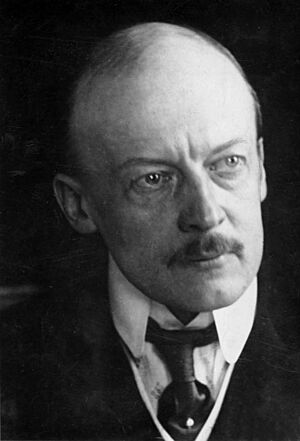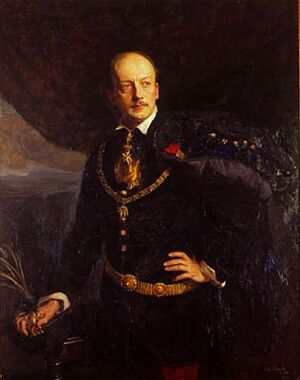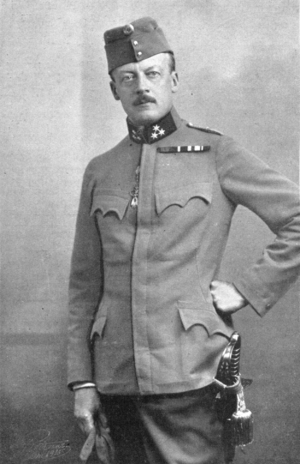Leopold Berchtold facts for kids
Quick facts for kids
Graf
Leopold Berchtold
|
|
|---|---|

Count von Berchtold
|
|
| Joint Foreign Minister of Austria-Hungary | |
| In office 17 February 1912 – 13 January 1915 |
|
| Preceded by | Alois Graf Lexa von Aehrenthal |
| Succeeded by | Stephan Freiherr Burián von Rajecz |
| Austro-Hungarian Ambassador to Russia | |
| In office 28 December 1906 – 25 March 1911 |
|
| Preceded by | Alois Graf Lexa von Aehrenthal |
| Succeeded by | Duglas Graf von Thurn und Valsássina-Como-Vercelli |
| Personal details | |
| Born | 18 April 1863 Vienna, Lower Austria, Archduchy of Austria, Austrian Empire |
| Died | 21 November 1942 (aged 79) Peresznye, Sopron County, Kingdom of Hungary |
| Spouse |
Countess Ferdinanda Károlyi de Nagykároly
(m. 1893) |
Leopold Anton Johann Sigismund Josef Korsinus Ferdinand Graf Berchtold (18 April 1863 – 21 November 1942) was an important politician and diplomat from Austria-Hungary. He served as the Foreign Minister when World War I began. He played a key role in the events leading up to the war.
Contents
Life and Career
Early Life and Diplomatic Work
Leopold Berchtold was born in Vienna, Austria, on April 18, 1863. His family was very wealthy and owned large areas of land in what is now the Czech Republic and Hungary. He was known as one of the richest people in Austria-Hungary.
He studied law at home and then joined the country's foreign service in 1893. This meant he would work as a diplomat, representing his country in other nations. In the same year, he married Countess Ferdinanda Károlyi, who also came from a very rich family in Hungary.
Berchtold worked at embassies in important cities like Paris (France), London (England), and St. Petersburg (Russia).
Ambassador to Russia
In 1906, Berchtold became the Ambassador to Russia. He spent five years there, learning about Russia's concerns about Austria-Hungary.
In 1908, he hosted a secret meeting at his home in Moravia. This meeting led to an agreement where Austria-Hungary took control of Bosnia and Herzegovina. This event caused a lot of tension in Europe.
When the previous foreign minister died in 1912, Berchtold was chosen to take his place. At 49, he became the youngest foreign minister in Europe. Some people felt he lacked experience in domestic and military matters.
The Balkan Wars
As foreign minister, Berchtold mainly focused on the Balkans, a region in Southeast Europe. He wanted to keep peace there and avoid getting involved in conflicts. However, the Balkan Wars in 1912 and 1913 made this goal very difficult.
At first, Berchtold considered going to war against Serbia. But he changed his mind at the last moment. He did manage to stop Serbia from getting access to the sea by helping create the country of Albania.
However, the Balkan Wars increased Russia's influence in the region. They also strengthened Serbia's desire to unite all South Slav people. This was seen as a diplomatic setback for Austria-Hungary. It also made Berchtold seem weak and unsure.
Berchtold worried that Serbia's growth would cause problems within Austria-Hungary. The empire was made up of many different ethnic groups. He feared that Serbian expansion could lead to the empire breaking apart.
The July Crisis
The assassination of Archduke Franz Ferdinand in Sarajevo on June 28, 1914, was a major turning point. This event happened because of the high tensions between Austria-Hungary and Serbia.
While some saw Berchtold as indecisive before, he showed more determination during the July Crisis. He saw the assassination as a chance to take strong action against Serbia.
On July 5, he sent a representative to Germany to get their support. Germany gave Austria-Hungary a "blank cheque," meaning they would support whatever action Austria-Hungary decided to take.
Berchtold then pushed for war against Serbia during a meeting on July 7. After some discussion, it was decided to send an ultimatum to Serbia. An ultimatum is a final demand.
The ultimatum had ten points and was sent to Serbia on July 23. Berchtold was very worried that Serbia might accept it. He even made changes to it the night before it was sent, adding clauses to make it harder to accept.
Serbia accepted almost all the demands. But they refused the point that would allow Austro-Hungarian officials to investigate the assassination on Serbian land. This would have violated Serbia's independence. Since all ten demands had to be accepted, Austria-Hungary declared war on Serbia on July 28. Berchtold was largely responsible for this decision.
World War I and Resignation
Once the war started, Berchtold focused on keeping Italy from joining the other side. Italy was part of an alliance with Austria-Hungary and Germany. However, Italy demanded control over some Austro-Hungarian territories in exchange for staying neutral.
Berchtold did not want to give up any land. But as Germany pressured him, he eventually agreed to give up some areas. When he told other leaders about these concessions, they forced him to resign on January 13, 1915. He was replaced by a more aggressive minister.
Berchtold did not have a public role for the rest of the war. He later became a high-ranking official in the royal court. He was honored with important awards, like the Order of the Golden Fleece and the Order of Saint Stephen of Hungary.
After the war, he retired to his estate in Hungary. He passed away on November 21, 1942.
Legacy
People at the time described Count Berchtold as smart and charming. He was well-liked at court because of his aristocratic background. However, he was thought to lack the strong character and wide experience needed for a foreign minister. This sometimes led to his decisions changing quickly, making his foreign policy seem inconsistent.
Many historians have called him indecisive. But during the July Crisis, he took charge and managed the situation. Historians still debate how much he was responsible for starting World War I. He certainly played a big part in the strong demands of the ultimatum and the declaration of war. He believed that defeating Serbia was the only way to save Austria-Hungary.
Some historians argue that he might not have fully understood that a war with Serbia could lead to a much bigger European war. But many other diplomats at the time also didn't fully grasp the consequences of their actions.
In Film and Television
Count Berchtold was played by actor John Gielgud in the 1969 film Oh! What A Lovely War.
See also
- Austro-Hungarian entry into World War I
 | May Edward Chinn |
 | Rebecca Cole |
 | Alexa Canady |
 | Dorothy Lavinia Brown |



